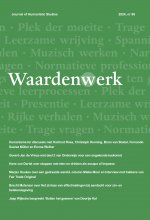
‘Past Those Green Temples’ – The Eco-Humanist Poetics of Mary Oliver, Louise Glück, and Anne Carson
Productgroep Waardenwerk 2024 96Omschrijving
Mary Oliver’s Humble Humanism
The preface for Mary Oliver’s poem ‘The River’, featured in her collection Dream Work (1986), cites an article by the New York Times: ‘In one day the Amazon discharges into the Atlantic the equivalent of New York City’s water supply for nine years.’(Dream Work 20). In the verses that follow this statistic, the poet (1935-2019) proposes a perspective that is at once human and river – merging the bodies of humanity and water in one. The poem’s speaker recalls her origins, wilfully ignoring the bureaucratic factoids of birthdate and place and defines themselves as ‘a grain / carried by the flood’ of a great, universal and unnamed river. This unnamed river, presumably the Amazon of the poem’s statistical prelude, carries the blueprint of the speaker’s history. It is also the place called ‘home’ by the speaker, a place remembered and yearned for. Throughout, the poem recalls a sense of wanting to belong and return to an unidentified and yet uniquely familiar river, or larger body of water. In a state of reverie, the speaker muses on how ‘the smell of mud and leaves returned to me / and in dreams I began to turn, / to sense the current’(20). The sensual borders of being human and being water merge completely here. Finally, after nostalgic remembrance, the speaker finds that it is ‘past those green temples’ where the final resting place is, where the body moves towards subconsciously, where home truly is.
As part of my research on contemporary lyricism and its dialectics of self-as-other, the following examines a particular strand of a poetics written by women in line with an eco-humanist approach. As seen through the introductory verses written by Oliver, the poetry and rhetoric features the human aspect, mediated through the speaker, that feels and speaks of an unbreakable tie between their body and the physical reality of the natural world. In this particular case, the cyclical tide and current of nature – and one might call it, metaphysically, the river of the world – is the place to return to and yearn for. It is a lyricism negotiating the indefinable space that lies between human self and ecological other.
This attempt to bridge the space between two presumably binary poles is resolved through an immersive effort in which the borders between the human and the ecological aspect are blurred and crossed. In the case of Oliver, this also involves a distinctly religious feel and tone in which the speaker works towards a spiritual relief achieved only in and through nature. In accordance with the ‘green temples’appearing in the first poem, the natural world is often a stage for spiritual and religious encounters and offers space for prayer, contemplation and release.
